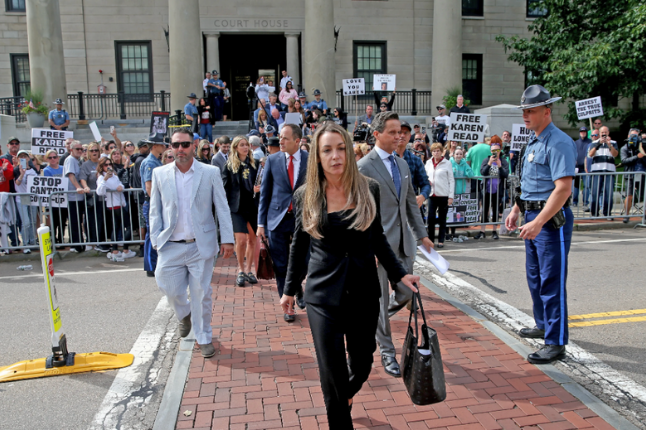The Karen Read trial is a blueprint for challenging corrupt power

For the past 30 days, millions of people have watched the Karen Read trial live. I tuned in three weeks ago on a whim. At this point, I’m relieved the closing arguments are tomorrow because I’ve even changed the dog-walk schedule to accommodate voire dire.
At first, I kept watching because I could imagine myself as Karen Read.
She was a financial analyst and former professor dating a cop named John O’Keefe in Canton, an insular Boston suburb full of peopple in law enforcement. Karen’s in her forties with no kids, and she loved John’s kids. If I squint, I can see that being my life. Especially the part about how she didn’t know the townies disliked her.
Here are the facts: a bunch of cops and their wives were at a bar getting smashed before driving home—normal behavior for Canton. Karen had somewhere between four and nine drinks, drove her boyfriend John to a friend’s house, then drove back to John’s place. When he didn’t respond to her texts, she left increasingly frantic voicemails: “John, I fucking hate you” and “You fucking pervert.” Fifty voicemails. He didn’t answer because he was dead.
The next morning, Karen was arrested for running him over with her car. She had been so drunk that her first response was, “Oh my god, could I have done that?”
Two years later, it’s absolutely clear that the autopsy shows he was punched, fell backward, and broke his neck on stairs in the home where she dropped him off. The police, the district attorney, and judge are all protecting the cop who threw the punch.
What I identify with is that the amount of trouble Karen found herself in is so far beyond anything reasonable. My life is littered with moments where I behaved poorly and the repercussions felt insane. This is me—my whole life. A whirlwind of having no idea how to navigate what’s happening around me and not being sure if it’s my own fault.
She sold her house to pay for her lawyer. She is smart, attractive, and destitute: My lost twin.
This district has a history of abusing its power to cover up bad behavior. But the most clear evidence of routine abuse is the brazen carelessness during the coverup. The chief investigator collected evidence by using a snow blower to clear the site and red Solo cups to gather samples. He wasn’t fired for that incompetence. He was fired for texting his friend that he was protecting the police involved and “looking for nudes” on Karen Read’s phone.
Yet even with that revelation, the DA continued pursuing the case against Karen Read.
People from all over the country were horrifed by the corruption and came together to help Karen Read. A YouTuber called Turtleboy has been running his own parallel investigation. It was clear he was doing a good job when the police arrested him. That made the FBI step in to hire an accident reconstruction company that found there was never a car accident in the first place. Even with clear evidence from the FBI that no collision occurred, the DA continued prosecuting.
Once the world recognized the widespread corruption, extremely expensive lawyers signed up to defend her pro bono.
This is where the Karen Read case really gets me: The lawyers are so smart and hardworking that to me, it’s a fairy tale. I want a team of five amazing lawyers showing up with me every day, everywhere I go.
But what I really identify with is the feeling of powerlessness in the face of corrupt authority.
Trump pardoned someone I used to work for. I was shocked. The guy’s crimes were against the US. And I’m still so scared of the guy’s power that I can’t even write his name here. I look at the Sarah Wynn-Williams’ book Careless People. She had to have had a community behind her to feel brave enough to write that leaders at Facebook are lying. When I wrote Sheryl Sandberg is dishonest Facebook cut off traffic to my site. It sounds small, but it makes standing up to powerful people scary.
Each day I see people illegally detained by ICE, I ask myself: what would it take for me to risk my life for justice? Or risk anything, really? What makes me stand up? I think about how alone and scared I feel when I’ve gotten myself into trouble unknowingly. But I’m never up against a death sentence—from a murder trial or deportation.
On one hand, I want to be the person who feels supported and defended by community. But I also feel a responsibility to be that community for others.
This, I think, is why I can’t stop watching. I love the community that has come together for Karen Read. I’m unsure where I fit and what I’m capable of, but I see the Karen Read trial as a blueprint for fighting back against corrupt power.
What’s at stake is not whether she’s innocent—she is. What’s at stake is our ability to insist on being part of a community where we trust each other to stand up for what’s right.

The whole police-involvement-cover-up business reminds me of the Laurencia Bembenek case in the early 1980s.
https://en.m.wikipedia.org/wiki/Laurie_Bembenek
Thank you for your reporting. I too am angry.
Cases like this are why Canadians are resisting Washington’s pressure to become the 51st state. Forget that noise.
This insulting pressure, even before tariffs hit, and before the reported border horrors, is why Canadians were booing during the US anthem at hockey games, and first began reducing their tourism to the US.
(Meanwhile, at the state level, trying to distant themselves from the feds, the states are offering hotel and travel discounts to Canadians, but it’s not working)
Bribing Canadians to come to the US: pathetic. I bet tourism is down across the board – not just Canada.